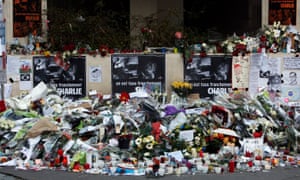New books and documentaries question French authorities’ response to 7 January attacks and examine possible intelligence failings

The first anniversary of terrorist attacks on the French satirical magazine Charlie Hebdo and a Paris kosher supermarket is being marked by ongoing questions and criticisms over security failings.
The families of some of the 17 people who died in the 7 January attacks have reiterated concerns about whether police protection should have been higher forCharlie Hebdo, which had been a prominent target since it published cartoons of the prophet Muhammad in 2006 and whose previous offices were firebombed in 2011.
A number of books and documentaries to be released during several days of official commemorations this week question the French authorities’ response to the attacks and examine potential intelligence failings relating to the three gunmen. Brothers Saïd and Chérif Kouachi, who attacked the magazine’s offices, and Amédy Coulibaly, who held hostages at the kosher supermarket, all had known links to extremist terrorist networks and yet were not under full surveillance.
Maryse Wolinski, a journalist and widow of the cartoonist Georges Wolinski, who was killed in the Charlie Hebdo attack, said the fact that 130 people were killed in fresh attacks on Paris 10 months later made the security questions even more harrowing. Wolinksi will publish a book this week, Darling, I’m Going to Charlie (the last words her husband said to her), in which she asks why the police protection of the magazine’s office and its staff had been relaxed in the months before the attacks.
The police car that had been permanently stationed outside the magazine’s office had been removed and replaced with foot patrols. “I was angry to hear the police van outside had disappeared the November [before the attacks]. There was no fixed guard, no more barriers,” Wolinski told Europe 1 radio. She said the gunmen had been given an “extraordinary” opportunity to carry out the attacks. “I’m trying to understand why.”
Wolinski said November’s attacks on the national stadium, Paris bars and the Bataclan concert hall, which is only a few hundred metres from Charlie Hebdo, had increased her outrage at the authorities. “My anger grew because I realised they hadn’t learned the lessons,” she said.
In a documentary on France 2 television, the widow of Franck Brinsolaro, the police protection officer for the Charlie Hebdo, editor Charb, who was killed with him during the attacks, says he had told her the threat had been underestimated.
“Franck knew if there was an attack, the [attackers] would be heavily armed and he would stand no chance,” Ingrid Brinsolaro says. “I think that those in charge should say that the threat was underestimated and the means weren’t put in place. I think they owe him that, they owe my children that.” She was still waiting for answers from the French interior minister.
The documentary also shows the confusion following the first 999 call which came after the gunmen, struggling to find the right entrance to the building, shot a maintenance man 10 minutes before they opened fire at Charlie Hebdo’s editorial meeting.
Although the address was in the Yellow Pages and printed in the weekly magazine, it was not on police files, so the connection was not initially made to the publication or to a potential terrorist attack.
The film shows that even in initial crisis meetings in the special interior ministry bunker, rivalries between French intelligence services were so bad that the interior minister had to order them to share information.
Le Monde gained access to declassified documents detailing the surveillance of the three gunmen from 2011 until the attacks, and described “a succession of missed opportunities” that resulted in tabs not being kept on the men.
As the investigation continues, several key questions remain, including whether there were accomplices and who masterminded and coordinated the attacks. These issues are even more pertinent in the wake of the November attacks, which were carried by several known jihadiss who were able to return from Syria unnoticed.
The French president, François Hollande, who is now styling himself as a father-of-the-nation and protector figure, will lead the commemorations this week, including giving a speech to security forces and unveiling plaques.
The largest public ceremony will take place on the Place de la République in Paris, where a commemorative oak tree will be planted and the French rocker Johnny Hallyday will perform a song written about the aftermath of the attacks.
On Wednesday, 1 million copies of a special anniversary edition of Charlie Hebdo will reach newsstands in France.
[Source:-the gurdian]
